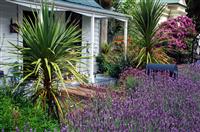
What is ornamental horticulture?
Broadly speaking it is the cultivation and arrangement of plants for their aesthetic value within a garden or park. In the horticulture industry this also includes producing plants for this purpose. If you work in ornamental horticulture you could be working in parks, gardens or a production nursery.
I want a broad horticultural qualification - what course can I do? This 700 hour course provides initial training for anyone working, or intending to work in ornamental horticulture - it covers a broad range of subject matter so that you can extend your career into one or move to a different industry sector if an opportunity arises.People with broad knowledge and skills are much sought after.
This course is similar to other VHT002 horticulture certificates in its introductory (core) units, but devotes 50% of the course to topics specifically related to ornamental horticulture. The course is designed to teach the basics of how to identify, grow, and maintain ornamental plants and gardens in any climate. Emphasis is placed on the plant varieties which are most horticultural value. Topics covered include garden maintenance, turf care, arboriculture, landscaping, and nursery work.
Broad knowledge of the fundamentals of horticulture are key to employment and advancement in horticulture - irrelevant of the industry sector. This course sets itself apart from others on offer. It is comprehensive, provides students with a challenge and builds the knowledge required for success in this field. Employers are looking for this in graduates - and are so disappointed by the poor output of many horticulture graduates. Undertake this course to place yourself ahead of the field!